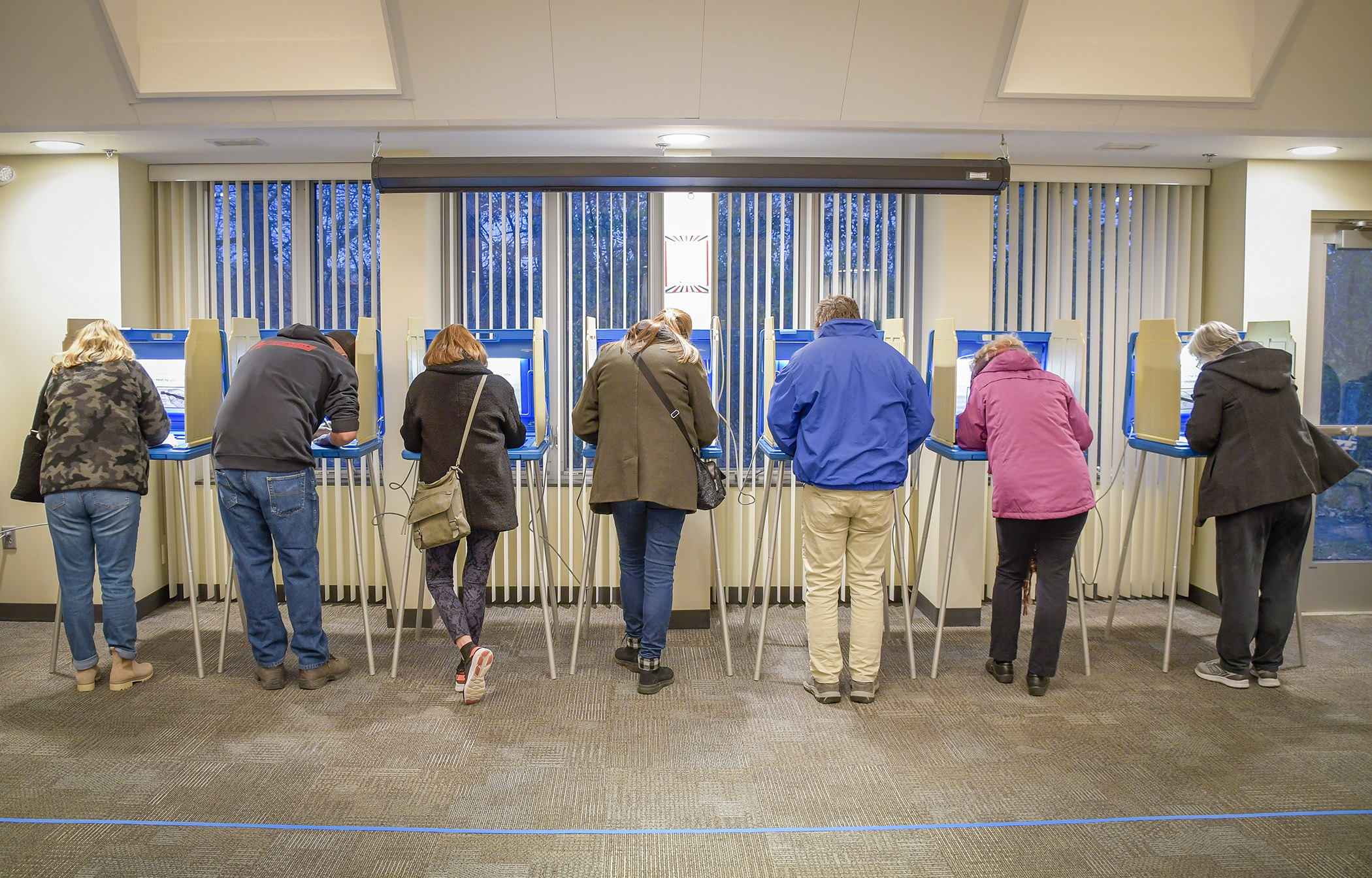Elections committee approves wide-ranging policy bill along party lines

— UPDATED at 8:04 p.m.
School board appointments, lobbying reporting, deepfakes and the “Minnesota Voting Rights Act” are all part of a bill receiving enough favorable votes Wednesday night.
Sponsored by Rep. Mike Freiberg (DFL-Golden Valley), HF4772 is the elections policy bill.
Approved, including a delete-all amendment, by the House Elections Finance and Policy Committee via an 8-4 party-line vote the bill’s next stop is the House Floor.
“This includes really good bills,” said Freiberg. “It corrects historical wrongs and federal mistakes. … The bill will improve the clarity of who and how our elections are influenced. It will expand voter access and voter understanding.”
Republican opposition stemmed largely from a lack of bipartisanship in the final product.
“We all want fair elections for everybody, we don’t want anybody to be discriminated against, yet there is only one side who are setting the rules for that,” said Rep. Ben Davis (R-Merrifield). ”… I would ask this committee as a whole (to) change its way of thinking and go a different direction and listen to us.”
Amendments unsuccessfully offered by Republicans include: provisional ballots required for voters who register on Election Day; voter ID required to cast a ballot; and a nonprofit or for-profit entity or organization that receives state funding may not expend money for any political purpose.
‘Minnesota Voting Rights Act’
Coming from HF3527, sponsored by Rep. Emma Greenman (DFL-Mpls), the “Minnesota Voting Rights Act” aims to ensure no one is denied an equal opportunity to vote.
It would do so, in part, by prohibiting voting standards that would deny or limit any citizen’s right to vote based on their race, color or language. Cited examples when the bill was heard March 6 include insufficient polling places, redistricting plans that “pack” persons of color to weaken their voting strength, and lack of language assistance for voters whose first language is not English
A political subdivision would work “in good faith” to remedy a potential violation, but further legal recourse would be possible.
School board appointments
A sizable increase in the time for when a special election is needed for a school board vacancy is included in the package.
Under current law, a vacancy can be filled by a board appointment until a special election is held; however, a special election is not required if the vacancy occurs less than 90 days prior to Election Day in the third year of the member’s term.
A change proffered by the Minnesota School Boards Association as HF4287, sponsored by Rep. Bianca Virnig (DFL-Eagan), would make it so if the vacancy occurs less than two years prior to the term’s expiration no special election is required.
An amendment lowering that to one year was rejected, as was an amendment to cap the number of board members seated by appointment. The same fate was met by an amendment to require a special election for the seat “be conducted in conjunction with the next state general election or the next school board election."
Proponents say the change would prevent costly — about $10,000 a pop — and labor-intensive special elections that generally have low voter turnout and that districts must fund out of their general operating funds that officials say are better spent serving students.
Opponents say the change takes local control away from voters and could be a way for the majority of a school board to easily appoint an ally, especially in districts with a political divide.
Deepfake
To reduce the spread of misinformation that could threaten the electoral process, Minnesota was a nation leader in enacting a law last year to criminalize the use of deepfakes to influence an election.
But times have changed and some updates through HF3625, sponsored by Rep. Zack Stephenson (DFL-Coon Rapids), are included in the committee package:
- adding forfeiture of nomination or office if a candidate is convicted of a deepfake crime;
- adding political party nominating convention; presidential nomination primary, state, local or special primary; and special election to statute that the crime must occur 90 days before a primary or general election; and
- permitting equitable relief, in addition to injunctive relief, against a person violating the law.
Other provisions in the amended bill include provisions that would:
- allow a statutory city to elect city council members by ward in certain circumstances:
- require designation of an additional polling place for at least one day on the campus of a postsecondary institution if requested by the institution or the student government organization. A previous 1,500-student minimum was removed;
- give a county board the option of appointment or a special election to fill a county sheriff or attorney opening;
- beginning with the 2030 census, count state and federal prisoners as residing where they come from rather than the location of the correctional facility;
- allow census workers access to multi-unit housing facilities at any time in the course of their duties. Current law is Jan. 1 to July 1 the year a census is conducted;
- require a paper voter registration form to provide space for a voter to provide a physical description of the location of their residence, if the voter resides in an area lacking a specific physical address;
- require voter registration applications available to students be paper or electronic, and also go to students eligible to pre-register to vote;
- update when voting instructions and sample ballots must be printed in languages other than English; and
- require the Campaign Finance and Public Disclosure Board to study and potentially recommend to the Legislature the definition of a lobbyist with a focus primarily on whether the law distinguishes, or should, between activities that constitute lobbying of a state government official and activities that constitute lobbying of a local official.
***
What’s in the bill?
The following are selected bills that have been incorporated in part or in whole into the elections policy bill:
- HF3435 (Virnig)
- HF3447 (Pursell)
- HF3527 (Greenman)
- HF3557 (Freiberg)
- HF3625 (Stephenson)
- HF3632 (Huot)
- HF4043 (Agbaje)
- HF4068 (Kraft)
- HF4243 (Freiberg)
- HF4287 (Virnig)
- HF4679 (Coulter)
- HF4772 (Freiberg)
Related Articles
Search Session Daily
Advanced Search OptionsPriority Dailies
Ways and Means Committee OKs proposed $512 million supplemental budget on party-line vote
By Mike Cook Meeting more needs or fiscal irresponsibility is one way to sum up the differences among the two parties on a supplemental spending package a year after a $72 billion state budg...
Meeting more needs or fiscal irresponsibility is one way to sum up the differences among the two parties on a supplemental spending package a year after a $72 billion state budg...
Minnesota’s projected budget surplus balloons to $3.7 billion, but fiscal pressure still looms
By Rob Hubbard Just as Minnesota has experienced a warmer winter than usual, so has the state’s budget outlook warmed over the past few months.
On Thursday, Minnesota Management and Budget...
Just as Minnesota has experienced a warmer winter than usual, so has the state’s budget outlook warmed over the past few months.
On Thursday, Minnesota Management and Budget...
